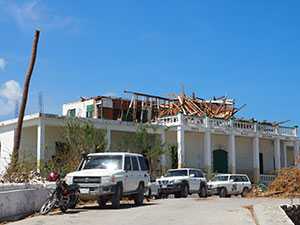Emergency Response and Recovery: About Us
What We Do: Provide Public Health Expertise in Emergencies
When disaster strikes, we are on the scene. We go wherever we are needed to help people affected by complex emergencies like war, famine, civil strife, natural disaster, genocide, and displacement.
Our experts help figure out what’s needed to protect the health of people in an emergency – for example, improving surveillance during an outbreak response, or evaluating feeding programs in post-conflict settings to prevent severe malnutrition in children.
For more information on Emergency Response and Recovery, see the Emergency Response and Recovery Fact Sheet [1 Page, 1.32 MB].
Why It’s Important
Today’s crises demand public health experts who can jump into emergencies and provide critical skills and leadership. Emergency response and recovery means being aware and involved every step of the way. Diseases can spread faster than ever, so we track global health threats 24/7 to stop them from crossing borders and keep people safe.
We know that natural disasters or other emergencies can leave people even more vulnerable to disease. When the unthinkable happens, people may be left without access to medical care or clean water. They may experience disruption of normal routines or crowded living conditions that provide fertile ground for outbreaks to spread.
We fight diseases across the world so we don’t have to fight them here at home. High-stakes epidemics like Ebola have shown us the need for a readily available group of public health responders who can deploy to control diseases from the moment we detect them. During and after a crisis, we need highly trained professionals in the field to stop the threat and help people recover from the impact.
How We Do It

When CDC’s help is requested – either by the U.S. or other governments, international agencies, or non-governmental organizations – our public health experts answer the call. Our teams have a broad range of skills in applied epidemiology, health assessments, surveillance activities, water and sanitation, and field investigations.
Our work focuses on 5 main areas:
- Investigations: We provide epidemic investigations, rapid health and nutrition assessments, public health surveillance, and disease prevention and control to monitor, track, and contain outbreaks at the source.
- Planning: We use findings from operational research projects to develop more effective public health interventions that can prevent the spread of disease. We also offer program evaluation and emergency preparedness support.
- Training: We help strengthen technical skills across CDC and U.S. government agencies; other governments; international and private volunteer organizations; and with students to build critical public health capabilities.
- Guidelines: We develop guidance internally and with partners on public health issues and technical areas, such as best practices in tracking outbreak-prone diseases in crowded settings.
- Partnerships: We build and maintain relationships with strategic multinational, international, and non-governmental partners, working together to strengthen global health security and protect people worldwide.
Where We Work
We have trained, expert responders ready to deploy wherever and whenever they are needed to provide cutting-edge expertise before, during, and after emergencies. Among many other emergencies, our responders have deployed to Haiti to increase access to safe water after the 2010 earthquake and 2016 hurricane, West Africa to stop the Ebola epidemic, Puerto Rico to communicate the severe consequences of the Zika virus, and Mozambique to help eradicate polio.
Fast Facts
- We support an average of 50 emergency responses each year
- 65 staff provide technical expertise in all critical areas of emergency response, including health; nutrition; infectious diseases; mental health; reproductive health; surveillance; coordination; logistics; and water, sanitation and hygiene
- Our staff spent over 9500 person-days deployed in the field in 2016
- We train and coordinate a roster of more than 400 staff across CDC who can rapidly deploy in emergencies
Our Organization
We are organized to respond quickly to crises around the world and provide expertise to support our many partners, whether it is supporting their headquarters offices through liaison positions, or directly in the field. Learn more about our partners.
- Page last reviewed: May 31, 2017
- Page last updated: May 31, 2017
- Content source:


 ShareCompartir
ShareCompartir